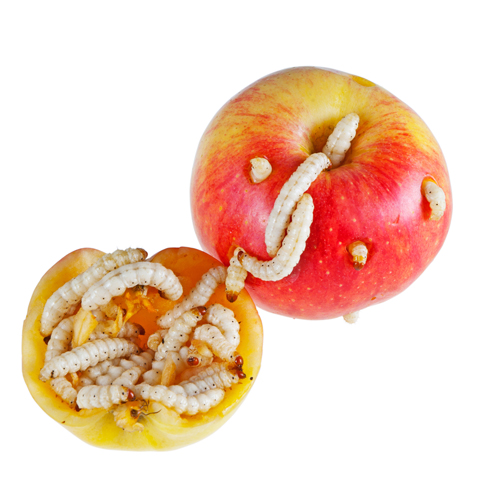
Here are the seven causes of food spoilage — from insects to mold and oh so much more — and how they could ruin your food preservation efforts.
To begin to understand the six food preservation options (refrigeration, canning, pickling and fermenting, salting, drying and freezing) it is helpful to have a basic understanding of what causes food spoilage.
The primary contributors to food spoilage are:
- Insects
- Oxygen
- Bacteria
- Yeasts
- Molds
- Moisture Loss
- Enzymes
Let's take a look at each one at a time.
Food Spoilage: Insects
Let’s start our discussion with insects. To store preserved food it is best to use metal, glass, and plastic food containers. Plastic bags or cardboard boxes can be more easily penetrated and infested.
Food Spoilage: Oxygen
Next, oxygen causes discoloration and can impact bacterial growth. Use airtight containers and wrap food tightly or vacuum seal to keep oxygen out of your food. Try to save things in qualities you will use so you do not keep exposing contents to oxygen.
Food Spoilage: Bacteria
Bacteria is also a cause of food spoilage. There are good bacteria that aid in fermentation but there are many bacteria that will make you sick. Keeping food preserved at the proper temperature in your refrigerator and freezer will help your food remain safe. Many bacteria need oxygen, so using vacuum sealing and canning to create a vacuum seal on your jar will keep oxygen out. Bacteria cannot grow in high acid foods but some can survive if they exist in the environment.
Food Spoilage: Yeasts
Yeasts can grow without air or with it. Food with yeast problems appear slimy, murky and can have scum. For some things like beer yeast can be beneficial but it can result in spoiled food. Yeasts like to grow in acid foods.
Food Spoilage: Enzymes
Enzymes are naturally in food. When we freeze or dry vegetables we blanch them to stop the enzymes from causing color changes, vitamin loss and loss of sugar content to mention just few things. Refrigeration does not kill enzymes but it does slow them down.
Food Spoilage: Moisture Loss
Foods lose moisture at higher temperatures so refrigeration is also a benefit for this source of spoilage. Drying your foods of their moisture purposely with a dehydrator or oven will slow the growth of bacteria who grow rapidly in moist conditions.
Food Spoilage: Molds
Molds need oxygen to grow so removing air from preserved foods will reduce mold growth. Molds can be destroyed by heating food to 190 degrees Fahrenheit. Mold will spread its toxin if present at all through all of a food except hard cheese.

Next Step: Get your FREE Printable Target Pack
Enhance your shooting precision with our 62 MOA Targets, perfect for rifles and handguns. Crafted in collaboration with Storm Tactical for accuracy and versatility.
Subscribe to the Gun Digest email newsletter and get your downloadable target pack sent straight to your inbox. Stay updated with the latest firearms info in the industry.

![Best Concealed Carry Guns In 2025 [Field Tested] Wilson Combat EDC X9S 1](https://gundigest.com/wp-content/uploads/Wilson-Combat-EDC-X9S-1-324x160.jpg)


![Best 9mm Carbine: Affordable PCCs [Tested] Ruger Carbine Shooting](https://gundigest.com/wp-content/uploads/Ruger-Carbine-Shooting-100x70.jpg)
![Best AR-15: Top Options Available Today [Field Tested] Harrington and Richardson PSA XM177E2 feature](https://gundigest.com/wp-content/uploads/Harrington-and-Richardson-PSA-XM177E2-feature-100x70.jpg)
